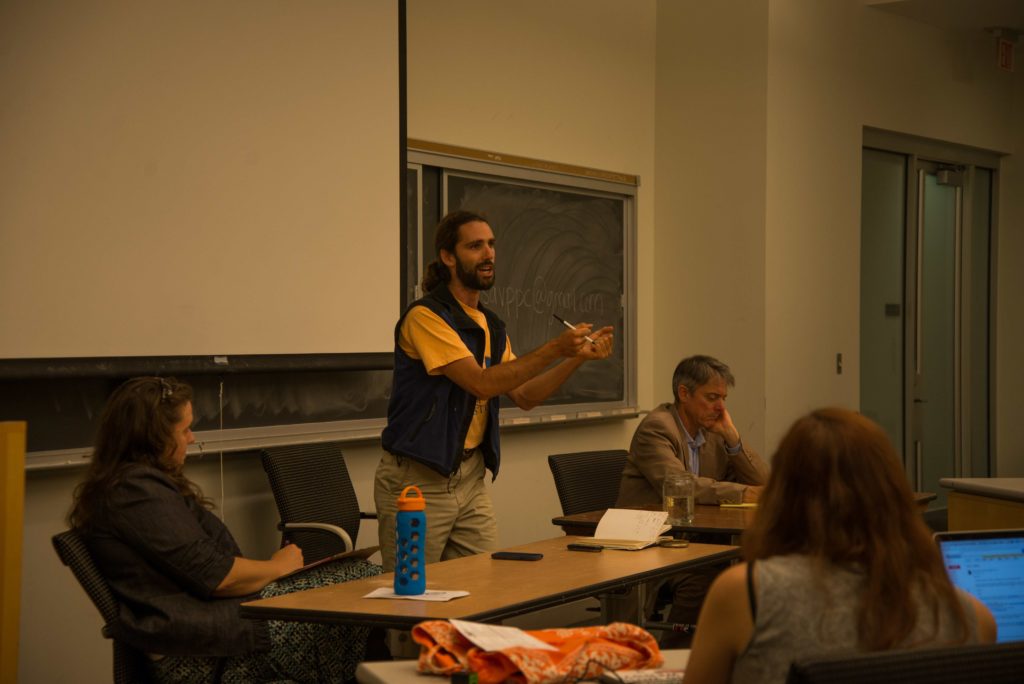By Olivia Arnold, news correspondent
The Husky Environmental Action Team (HEAT) hosted a talk by grassroots environmentalists Jay O’Hara and Marla Marcum along with Bristol County district attorney Sam Sutter at Northeastern Wednesday night.
O’Hara addressed HEAT members first, as he recounted his act of environmental civil disobedience that sparked nationwide attention. On May 15, 2013, O’Hara and fellow activist Ken Ward blocked a 689-foot freighter from delivering 40,000 tons of coal to Brayton Point Power Plant in Somerset, Mass. They used a 32 foot lobster boat, a 200 pound anchor and a banner reading “#coalisstupid.”
The lobster boat, named “The Henry T.”in honor of civil disobedience leader Henry David Thoreau, was successful in blocking “The Energy Enterprise”from delivering the day’s shipment of coal to the largest coal-fired power plant in New England.
“When we behave like the world is ending, when we behave and act in a way in our own lives that commensurate with the problem, that enactment of truth speaks more powerfully, I believe, to people than any words that can come out of our mouths,” O’Hara said.
O’Hara emphasized the necessity for civil disobedience when all viable legal avenues have failed and that real social change occurs through a series of direct actions that inspire contagious transformation.
Marcum, who participated in the planning, funding and press work for O’Hara and Ward’s protest, stressed the importance of working with a team to bring about social change.
“Our culture really teaches us to address problems as an individual,” Marcum said. Optimistic young activists are bound to run into resistance when standing up to the system — which Marcum said can often be disheartening. “Individually we can change other individuals…Individually, we cannot shift an entire system.”
The coast guard ordered O’Hara and Ward to leave and, although O’Hara and Ward were not formally arrested, the two activists were charged with disturbing the peace, conspiracy to disturb the peace, negligent operation of a motor vessel and failure to act to avoid a collision of a boat, which could potentially equate to thousands of dollars in fines and a maximum sentence of twoyears prison time.
However, Bristol County District Attorney (DA) Sam Sutter dropped all criminal charges against O’Hara and Ward and reduced the remaining three charges to civil offenses. To justify his decision, Sutter delivered a speech outside the courthouse, calling climate change “one of the gravest crises our planet has ever faced.” Sutter later marched alongside O’Hara and Ward at the People’s Climate March in New York City this September.
“[I was] very inspired by the DA and his just seeminglytrue conviction when it comes to climate change and his awareness of the lack of information, or the lack of involvement when it comes to politicians in his sphere,” Bryan Belice, a fourth year environmental studies major, said. “So I was glad that he recognized that and was wanting to make a shift from the inside.”
O’Hara, Ward, Marcum and Sutter formed an unlikely, but influential team.
“This specific case… it’s a really great example of how different people play different roles in the movement… activists plotting to block a coal freighter from delivering coal to send a symbolic message that we reject this continuation on the path towards of climate chaos,”Austin Williams, a third year student and HEAT president, said. “I think that kind of combination of perspective gave our members a pretty good behind the scenes look at how these things play out.”
Through sharing their experiences dealing with the coal corporation, the Somerset police and the Bristol county legal system — the environmental activist team inspired Northeastern students to take direct action against social injustice.
“Each person has to come out of their comfort zones and push themselves; they can’t just ride the wave or do the actions they’ve been doing, because nothing’s going to change. Marley Kimelman, a second year student and HEATPR and Marketing head, said. “I think that was really to motivate the club on stepping out of their comfort zones.”
Following O’Hara and Ward’s act of civil disobedience, a climate-focused campaign called 350.org organized a 400-person protest at Brayton Point Power Plant in July 2013, where 44 protestors were arrested. Environmental activists then organized the “Energy Exodus” in Sept. 2013, a six-day, 60-mile march to rally for the closing of the power plant. As a result of these three protests and pressure from the surrounding community, the 51–year–old power plant announced that it will be closing in 2017. While Sutter called the closing of the largest source of carbon emission in the Northeast “a positive win” for the climate change movement, O’Hara was more hesitant.
“There is no guarantee that the plant will close,” O’Hara said. “They have said they will close, but one of the most damaging things is [our government] has done nothing to legally prevent coal from being burned in Massachusetts. So they could say tomorrow ‘hey just kidding guys, we make a lot of money here, let’s keep going.’ We have to solve that.”
Photo by Arzu Martinez









